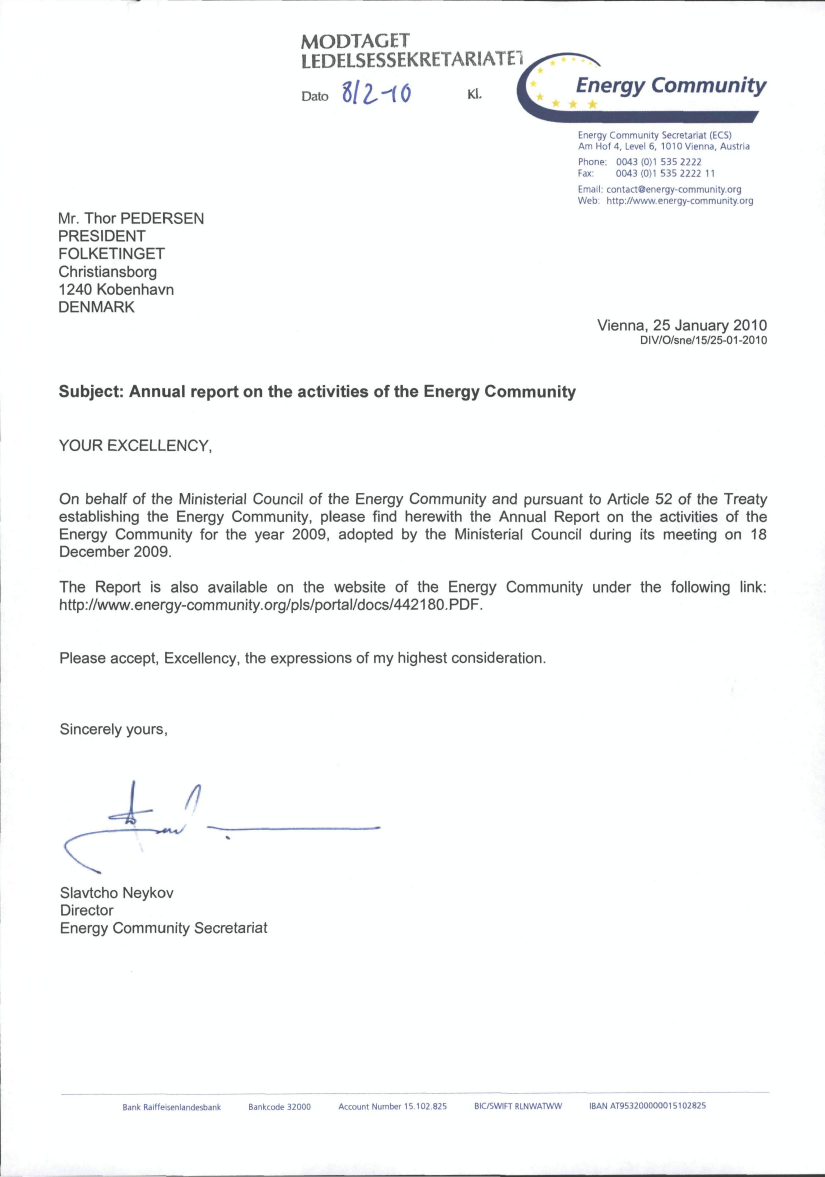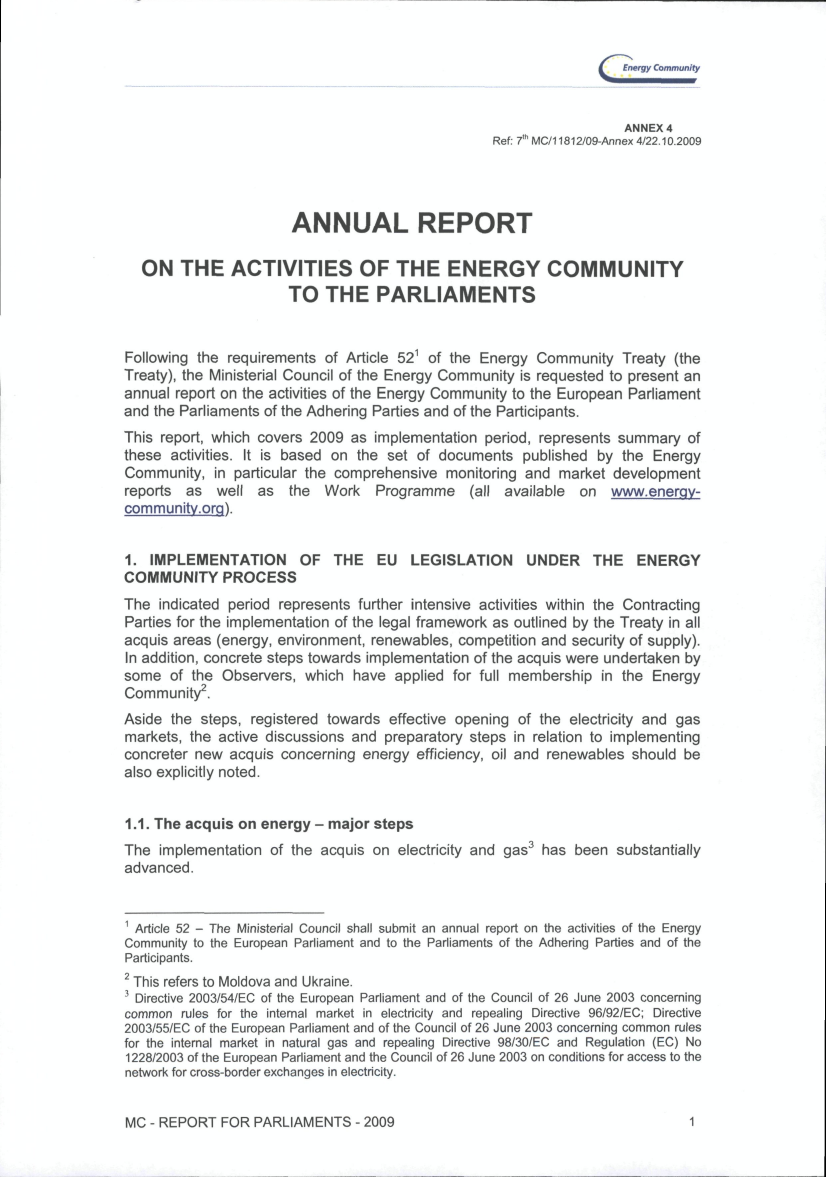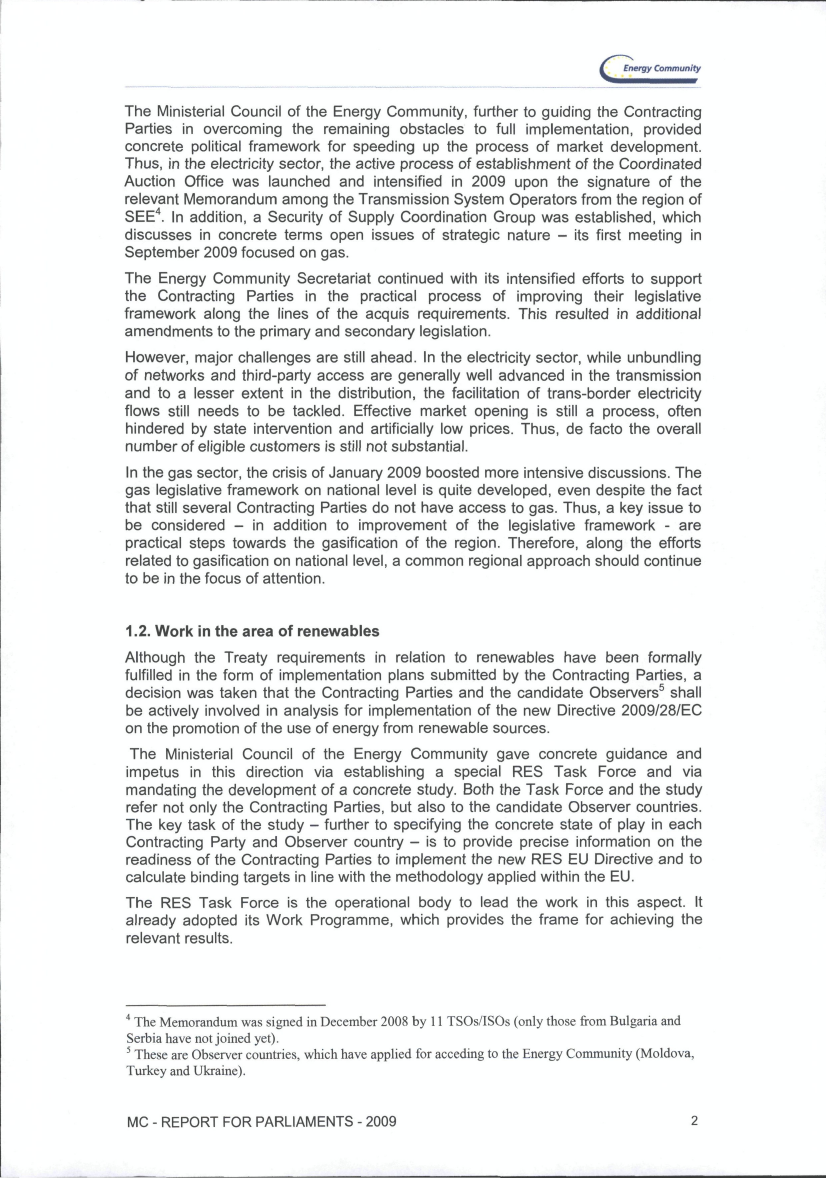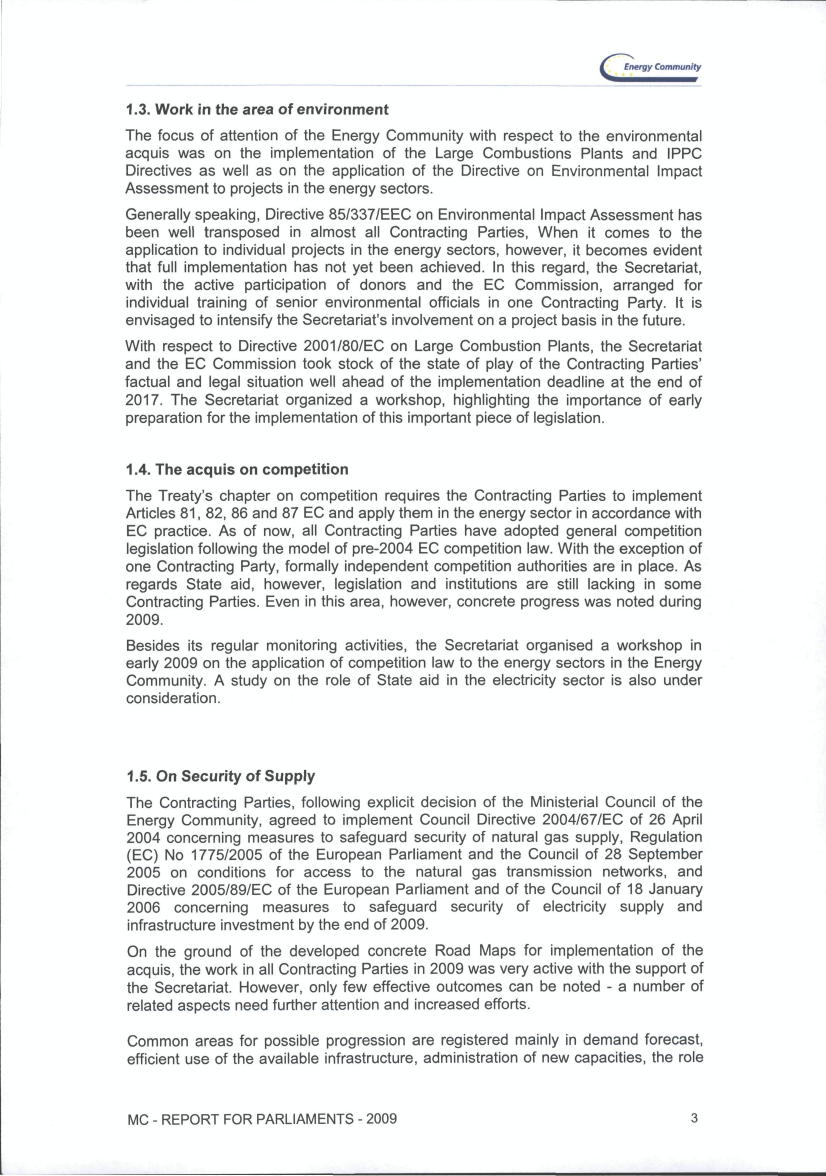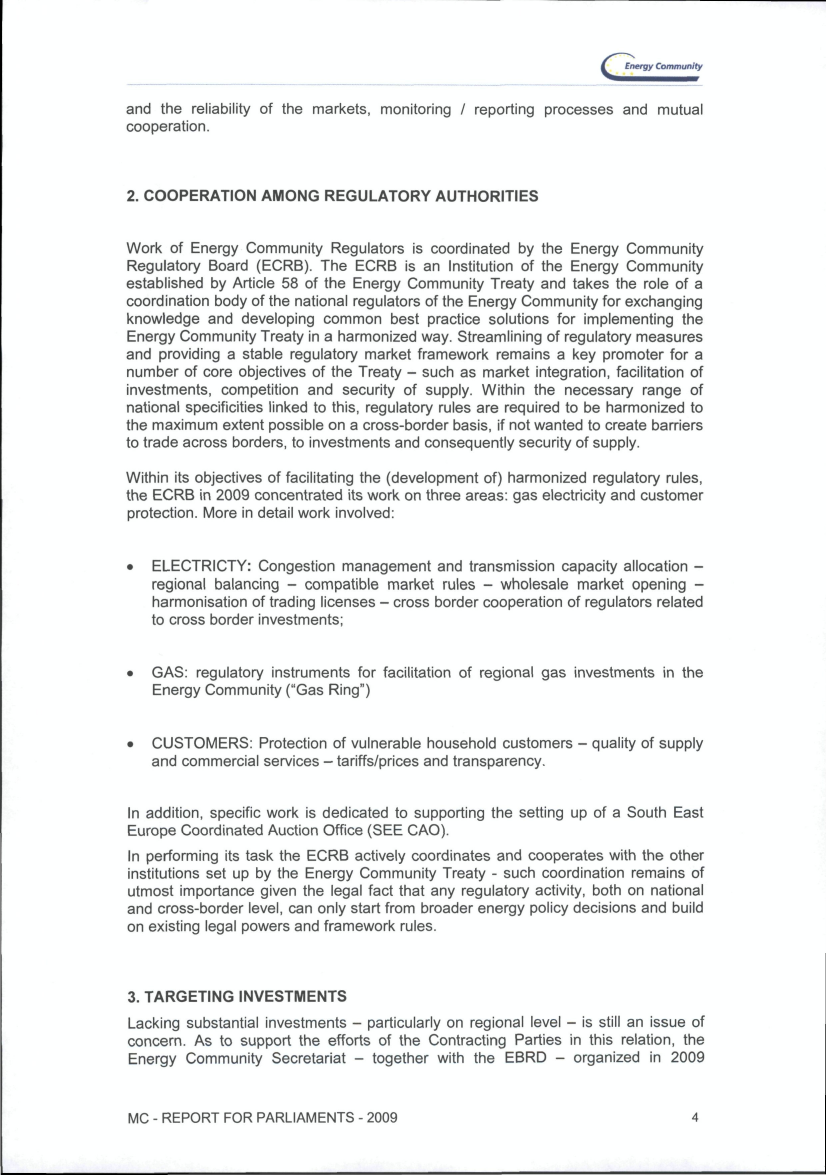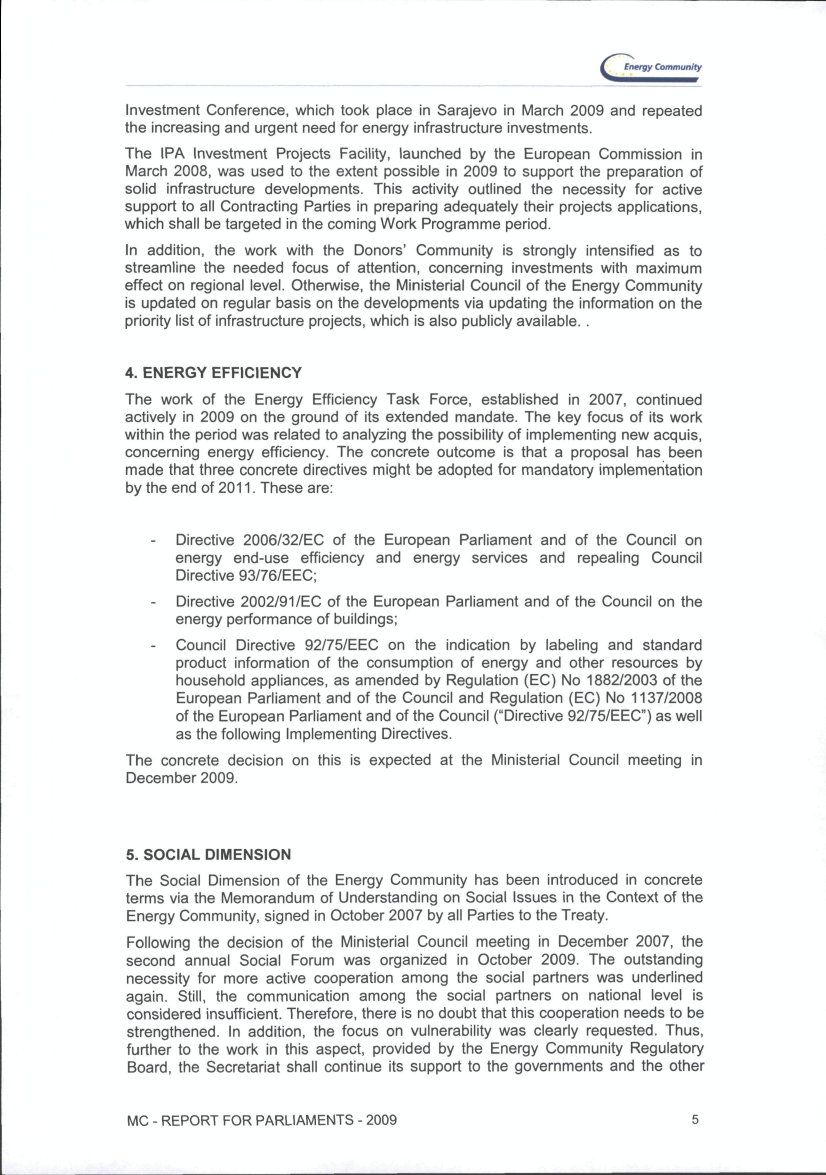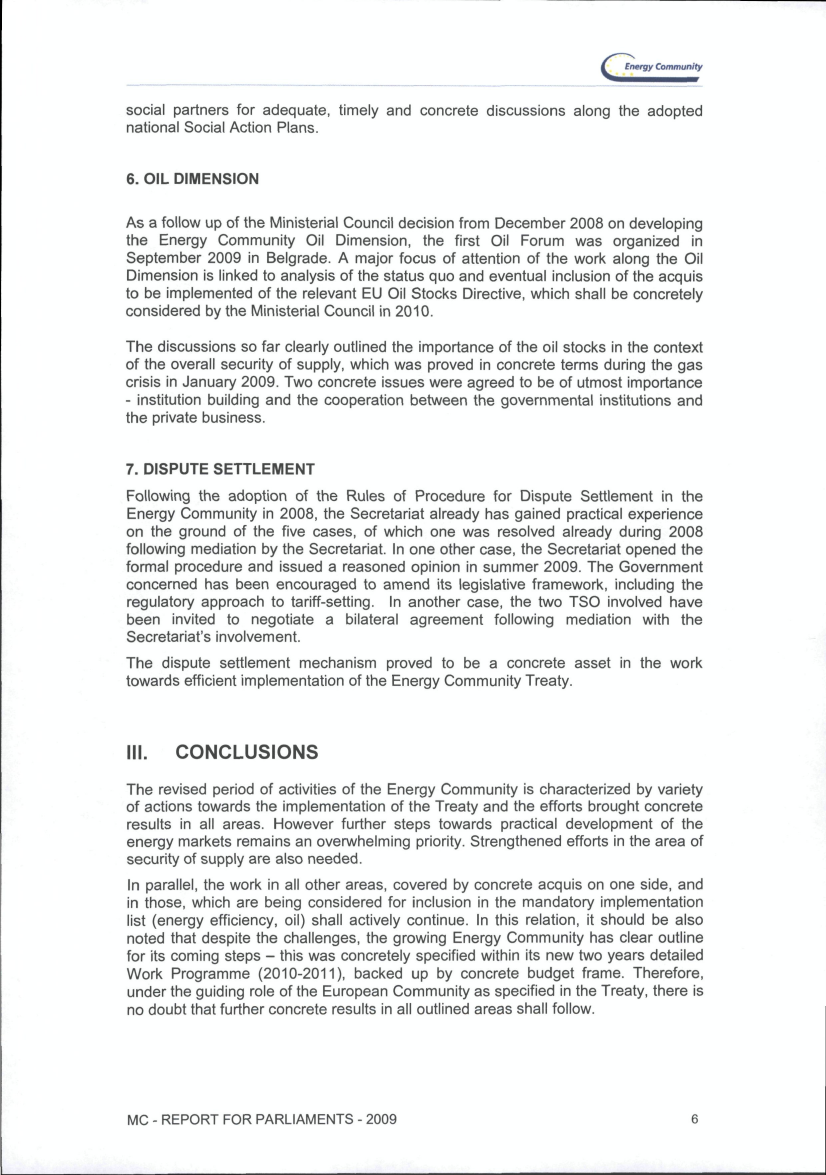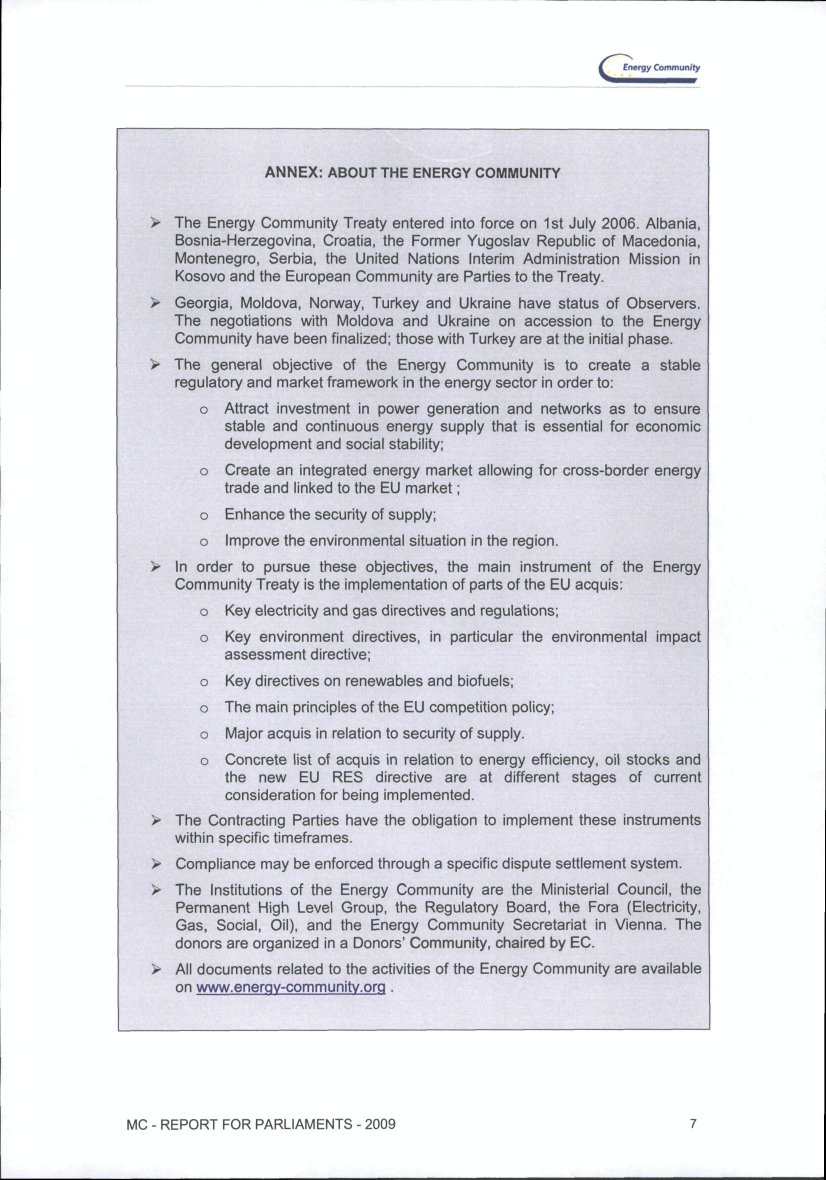Det Energipolitiske Udvalg 2009-10
EPU Alm.del Bilag 153
Offentligt
MODTAGETLEDELSESSEKRETARIATE1Dato
ill-iO
Kl.
l
EnEnergy CommunityEnergy Community Secretariat (ECS)Am Hof 4, Level 6, 1010 Vienna, AustriaPhone: 0043(0)1 535 2222Fax:0043(0)1 535 2222 11Email: [email protected]Web: http://www.energy-community.org
Mr. Thor PEDERSENPRÉSIDENTFOLKETINGETChristiansborg1240 KobenhavnDENMARKVienna, 25 January 2010DIV/O/sne/15/25-01-2010
Subject: Annual report on the activities of the Energy Community
YOUR EXCELLENCY,
On behalf of the Ministerial Council of the Energy Community and pursuant to Article 52 of the Treatyestablishing the Energy Community, please find herewith the Annual Report on the activities of theEnergy Community for the year 2009, adopted by the Ministerial Council during its meeting on 18December 2009.The Report is also available on the website of the Energy Community under the following link:http.7/www.energy-community.org/pls/portal/docs/442180.PDF.
Please accept, Excellency, the expressions of my highest consideration.
Sincerely yours,
1
•*!*/
Slavtcho NeykovDirectorEnergy Community Secretariat
Bank Raiffeisenlandesbank
Bankcode 32000
Account Number 15 102.825
BIC/SWIFT RLNWATWW
IBAN AT9532O00O0O15102825
£EmEnergy Community
ANNEX 4Ref: 7,hMC/11812/09-Annex 4/22.10.2009
ANNUAL REPORTON THE ACTIVITIES OF THE ENERGY COMMUNITYTO THE PARLIAMENTSFollowing the requirements of Article 521of the Energy Community Treaty (theTreaty), the Ministerial Council of the Energy Community is requested to present anannual report on the activities of the Energy Community to the European Parliamentand the Parliaments of the Adhering Parties and of the Participants.This report, which covers 2009 as implementation period, represents summary ofthese activities. It is based on the set of documents published by the EnergyCommunity, in particular the comprehensive monitoring and market developmentreports as well as the Work Programme (all available on www.energv-community.org).
1. IMPLEMENTATION OF THE EU LEGISLATION UNDER THE ENERGYCOMMUNITY PROCESSThe indicated period represents further intensive activities within the ContractingParties for the implementation of the legal framework as outlined by the Treaty in allacquis areas (energy, environment, renewables, competition and security of supply).In addition, concrete steps towards implementation of the acquis were undertaken bysome of the Observers, which have applied for full membership in the EnergyCommunity2.Aside the steps, registered towards effective opening of the electhcity and gasmarkets, the active discussions and preparatory steps in relation to implementingconcreter new acquis concerning energy efficiency, oil and renewables should bealso explicitly noted.1.1. The acquis on energy - major stepsThe implerimplementation of the acquis on electhcity and gas3has been substantiallyadvanced.
Article 52 - The Ministerial Council shall submit an annual report on the activities of the EnergyCommunity to the European Parliament and to the Parliaments of the Adhering Parties and of theParticipants.2
1
This refers to Moldova and Ukraine.Directive 2003/54/EC of the European Parliament and of the Council of 26 June 2003 concerningcommon rules for the internal market in electricity and repealing Directive 96/92/EC; Directive2003/55/EC of the European Parliament and of the Council of 26 June 2003 concerning common rulesfor the internal market in natural gas and repealing Directive 98/30/EC and Regulation (EC) No1228/2003 of the European Parliament and the Council of 26 June 2003 on conditions for access to thenetwork for cross-border exchanges in electricity.3
MC - REPORT FOR PARLIAMENTS - 2009
f
EEnergym
Community
The Ministerial Council of the Energy Community, further to guiding the ContractingParties in overcoming the remaining obstacles to full implementation, providedconcrete politicai framework for speeding up the process of market development.Thus, in the electricity sector, the active process of establishment of the CoordinatedAuction Office was launched and intensified in 2009 upon the signature of therelevant Memorandum among the Transmission System Operators from the region ofSEE4. In addition, a Security of Supply Coordination Group was established, whichdiscusses in concrete terms open issues of strategic nature - its first meeting inSeptember 2009 focused on gas.The Energy Community Secretariat continued with its intensified efforts to supportthe Contracting Parties in the practical process of improving their legislativeframework along the lines of the acquis requirements. This resulted in additionalamendments to the primary and secondary legislation.However, major challenges are still ahead. In the electricity sector, while unbundlingof networks and third-party access are generally well advanced in the transmissionand to a lesser extent in the distribution, the facilitation of trans-border electricityflows still needs to be tackled. Effective market opening is still a process, oftenhindered by state intervention and artificially low prices. Thus, de facto the overallnumber of eligible customers is still not substantial.In the gas sector, the crisis of January 2009 boosted more intensive discussions. Thegas legislative framework on national level is quite developed, even despite the faetthat still several Contracting Parties do not have access to gas. Thus, a key issue tobe considered - in addition to improvement of the legislative framework - arepractical steps towards the gasification of the region. Therefore, along the effortsrelated to gasification on national level, a common regional approach should continueto be in the focus of attention.
1.2. Work in the area of renewablesAlthough the Treaty requirements in relation to renewables have been formallyfulfilled in the form of implementation plans submitted by the Contracting Parties, adecision was taken that the Contracting Parties and the candidate Observers5shallbe actively involved in analysis for implementation of the new Directive 2009/28/ECon the promotion of the use of energy from renewable sources.The Ministerial Council of the Energy Community gave concrete guidance andimpetus in this direction via establishing a special RES Task Force and viamandating the development of a concrete study. Both the Task Force and the studyrefer not only the Contracting Parties, but also to the candidate Observer countries.The key task of the study - further to specifying the concrete state of play in eachContracting Party and Observer country - is to provide precise information on thereadiness of the Contracting Parties to implement the new RES EU Directive and tocalculate binding targets in line with the methodology applied within the EU.The RES Task Force is the operational body to lead the work in this aspect. Italready adopted its Work Programme, which provides the frame for achieving therelevant results.
4
The Memorandum was signed in December 2008 by 11 TSOs/ISOs (only those from Bulgaria andSerbia have not joined yet).5These are Observer countries, which have applied for acceding to the Energy Community (Moldova,Turkey and Ukraine).
MC - REPORT FOR PARLIAMENTS - 2009
2
f
EmEnergy
Community
1.3. Work in the area of environmentThe focus of attention of the Energy Community with respect to the environmentalacquis was on the implementation of the Large Combustions Piants and IPPCDirectives as well as on the application of the Directive on Environmental ImpactAssessment to projects in the energy sectors.Generally speaking, Directive 85/337/EEC on Environmental Impact Assessment hasbeen well transposed in almost all Contracting Parties, When it comes to theapplication to individual projects in the energy sectors, however, it becomes evidentthat full implementation has not yet been achieved. In this regard, the Secretariat,with the active participation of donors and the EC Commission, arranged forindividual training of senior environmental officials in one Contracting Party. It isenvisaged to intensify the Secretahat's involvement on a project basis in the future.With respect to Directive 2001/80/EC on Large Combustion Piants, the Secretariatand the EC Commission took stock of the state of play of the Contracting Parties'factual and legal situation well ahead of the implementation deadline at the end of2017. The Secretariat organized a workshop, highlighting the importance of earlypreparation for the implementation of this important piece of legislation.
1.4. The acquis on competitionThe Treaty's chapter on competition requires the Contracting Parties to implementArticles 81, 82, 86 and 87 EC and apply them in the energy sector in accordance withEC practice. As of now, all Contracting Parties have adopted general competitionlegislation following the model of pre-2004 EC competition law. With the exception ofone Contracting Party, formally independent competition authorities are in place. Asregards State aid, however, legislation and institutions are still lacking in someContracting Parties. Even in this area, however, concrete progress was noted during2009.Besides its regular monitoring activities, the Secretariat organised a workshop inearly 2009 on the application of competition law to the energy sectors in the EnergyCommunity. A study on the role of State aid in the electricity sector is also underconsideration.
1.5. On Security of SupplyThe Contracting Parties, following explicit decision of the Ministerial Council of theEnergy Community, agreed to implement Council Directive 2004/67/EC of 26 April2004 concerning measures to safeguard security of natural gas supply, Regulation(EC) No 1775/2005 of the European Parliament and the Council of 28 September2005 on conditions for access to the natural gas transmission networks, andDirective 2005/89/EC of the European Parliament and of the Council of 18 January2006 concerning measures to safeguard security of electricity supply andinfrastructure investment by the end of 2009.On the ground of the developed concrete Road Maps for implementation of theacquis, the work in all Contracting Parties in 2009 was very active with the support ofthe Secretariat. However, only few effective outcomes can be noted - a number ofrelated aspects need further attention and increased efforts.Common areas for possible progression are registered mainly in demand forecast,efficient use of the available infrastructure, administration of new capacities, the role
MC - REPORT FOR PARLIAMENTS - 2009
f
EmEnergy Community
and the reliability of the markets, monitoring / reporting processes and mutualcoopération.
2. COOPÉRATION AMONG REGULATORY AUTHORITIES
Work of Energy Community Regulators is coordinated by the Energy CommunityRegulatory Board (ECRB). The ECRB is an Institution of the Energy Communityestablished by Article 58 of the Energy Community Treaty and takes the role of acoordination body of the national regulators of the Energy Community for exchangingknowledge and developing common best practice solutions for implementing theEnergy Community Treaty in a harmonized way. Streamlining of regulatory measuresand providing a stable regulatory market framework remains a key promoter for anumber of core objectives of the Treaty - such as market integration, facilitation ofinvestments, competition and security of supply. Within the necessary range ofnational specificities linked to this, regulatory rules are required to be harmonized tothe maximum extent possible on a cross-border basis, if not wanted to create barriersto tråde across horders, to investments and consequently security of supply.Within its objectives of facilitating the (development of) harmonized regulatory rules,the ECRB in 2009 concentrated its work on three areas: gas electricity and customerprotection. More in detail work involved:
•
ELECTRICTY: Congestion management and transmission capacity allocation -regional balancing - compatible market rules - wholesale market opening -harmonisation of trading licenses - cross border coopération of regulators relatedto cross border investments;
GAS: regulatory instruments for facilitation of regional gas investments in theEnergy Community ("Gas Ring")
•
CUSTOMERS: Protection of vulnerable household customers - quality of supplyand commercial services - tariffs/prices and transparency.
In addition, specific work is dedicated to supporting the setting up of a South EastEurope Coordinated Auction Office (SEE CAO).In performing its task the ECRB actively coordinates and cooperates with the otherinstitutions set up by the Energy Community Treaty - such coordination remains ofutmost importance given the legal faet that any regulatory activity, both on nationaland cross-border level, can only start from broader energy policy decisions and buildon existing legal powers and framework rules.
3. TARGETING INVESTMENTSLacking substantial investments - particularly on regional level - is still an issue ofconcern. As to support the efforts of the Contracting Parties in this relation, theEnergy Community Secretariat - together with the EBRD - organized in 2009
MC - REPORT FOR PARLIAMENTS - 2009
f
EmEnergy
Community
Investment Conference, which took place in Sarajevo in March 2009 and repeatedthe increasing and urgent need for energy infrastructure investments.The IPA Investment Projects Facility, launched by the European Commission inMarch 2008, was used to the extent possible in 2009 to support the preparation ofsolid infrastructure developments. This activity outlined the necessity for activesupport to all Contracting Parties in preparing adequately their projects applications,which shall be targeted in the coming Work Programme period.In addition, the work with the Donors' Community is strongly intensified as tostreamline the needed focus of attention, concerning investments with maximumeffect on regional level. Otherwise, the Ministerial Council of the Energy Communityis updated on regular basis on the developments via updating the information on thepriority list of infrastructure projects, which is also publicly available. .4. ENERGY EFFICIENCYThe work of the Energy Efficiency Task Force, established in 2007, continuedactively in 2009 on the ground of its extended mandate. The key focus of its workwithin the period was related to analyzing the possibility of implementing new acquis,concerning energy efficiency. The concrete outcome is that a proposal has beenmade that three concrete directives might be adopted for mandatory implementationby the end of 2011. These are:
Directive 2006/32/EC of the European Parliament and of the Council onenergy end-use efficiency and energy services and repealing CouncilDirective 93/76/EEC;Directive 2002/91/EC of the European Parliament and of the Council on theenergy performance of buildings;Council Directive 92/75/EEC on the indication by labeling and standardproduct information of the consumption of energy and other resources byhousehold appliances, as amended by Regulation (EC) No 1882/2003 of theEuropean Parliament and of the Council and Regulation (EC) No 1137/2008of the European Parliament and of the Council ("Directive 92/75/EEC") as wellas the following Implementing Directives.The concrete decision on this is expected at the Ministerial Council meeting inDecember 2009.
5. SOCIAL DIMENSIONThe Social Dimension of the Energy Community has been introduced in concreteterms via the Memorandum of Understanding on Social Issues in the Context of theEnergy Community, signed in October 2007 by all Parties to the Treaty.Following the decision of the Ministerial Council meeting in December 2007, thesecond annual Social Forum was organized in October 2009. The outstandingnecessity for more active coopération among the social partners was underlinedagain. Still, the communication among the social partners on national level isconsidered insufficient. Therefore, there is no doubt that this coopération needs to bestrengthened. In addition, the focus on vulnerability was clearly requested. Thus,further to the work in this aspect, provided by the Energy Community RegulatoryBoard, the Secretariat shall continue its support to the governments and the other
MC - REPORT FOR PARLIAMENTS - 2009
^
EmEnergy Community
social partners for adequate, timely and concrete discussions along the adoptednational Social Action Plans.6. OIL DIMENSIONAs a follow up of the Ministerial Council decision from December 2008 on developingthe Energy Community Oil Dimension, the first Oil Forum was organized inSeptember 2009 in Belgrade. A major focus of attention of the work along the OilDimension is linked to analysis of the status quo and eventual inclusion of the acquisto be implemented of the relevant EU Oil Stocks Directive, which shall be concretelyconsidered by the Ministerial Council in 2010.The discussions so far clearly outlined the importance of the oil stocks in the contextof the overall security of supply, which was proved in concrete terms during the gascrisis in January 2009. Two concrete issues were agreed to be of utmost importance- institution building and the coopération between the governmental institutions andthe private business.
7. DISPUTE SETTLEMENTFollowing the adoption of the Rules of Procedure for Dispute Settlement in theEnergy Community in 2008, the Secretariat already has gained practical experienceon the ground of the five cases, of which one was resolved already during 2008following mediation by the Secretariat. In one other case, the Secretariat opened theformal procedure and issued a reasoned opinion in summer 2009. The Governmentconcerned has been encouraged to amend its legislative framework, including theregulatory approach to tariff-setting. In another case, the two TSO involved havebeen invited to negotiate a bilateral agreement following mediation with theSecretariat's involvement.The dispute settlement mechanism proved to be a concrete asset in the worktowards efficient implementation of the Energy Community Treaty.
III.
CONCLUSIONS
The revised period of activities of the Energy Community is characterized by varietyof actions towards the implementation of the Treaty and the efforts brought concreteresults in all areas. However further steps towards practical development of theenergy markets remains an overwhelming priority. Strengthened efforts in the area ofsecurity of supply are also needed.In parallel, the work in all other areas, covered by concrete acquis on one side, andin those, which are being considered for inclusion in the mandatory implementationlist (energy efficiency, oil) shall actively continue. In this relation, it should be alsonoted that despite the challenges, the growing Energy Community has clear outlinefor its coming steps - this was concretely specified within its new two years detailedWork Programme (2010-2011), backed up by concrete budget frame. Therefore,under the guiding role of the European Community as specified in the Treaty, there isno doubt that further concrete results in all outlined areas shall follow.
MC - REPORT FOR PARLIAMENTS - 2009
C EnCommunityEnergy
ANNEX: ABOUT THE ENERGY COMMUNITY
>
The Energy Community Treaty entered into force on 1st July 2006. Albania,Bosnia-Herzegovina, Croatia, the Former Yugoslav Republic of Macedonia,Montenegro, Serbia, the United Nations Interim Administration Mission inKosovo and the European Community are Parties to the Treaty.Georgia, Moldova, Norway, Turkey and Ukraine have status of Observers.The negotiations with Moldova and Ukraine on accession to the EnergyCommunity have been finalized; those with Turkey are at the initial phase.The general objective of the Energy Community is to create a stableregulatory and market framework in the energy sector in order to:oAttrået investment in power generation and networks as to ensurestable and continuous energy supply that is essential for economicdevelopment and social stability;Create an Integrated energy market allowing for cross-border energytråde and linked to the EU market;Enhance the security of supply;Improve the environmental situation in the region.
>
>
ooo>
In order to pursue these objectives, the main instrument of the EnergyCommunity Treaty is the implementation of parts of the EU acquis:ooooooKey electricity and gas directives and regulations;Key environment directives, in particular the environmental impactassessment directive;Key directives on renewables and biofuels;The main principles of the EU competition policy;Major acquis in relation to security of supply.Concrete list of acquis in relation to energy efficiency, oil stocks andthe new EU RES directive are at different stages of currentconsideration for being implemented.
>>>
The Contracting Parties have the obligation to implement these instrumentswithin specific timeframes.Compliance may be enforced through a specific dispute settlement system.The Institutions of thePermanent High LevelGas, Social, Oil), anddonors are organized inEnergy Community are the Ministerial Council, theGroup, the Regulatory Board, the Fora (Electricity,the Energy Community Secretariat in Vienna. Thea Donors' Community, chaired by EC.
>
All documents related to the activities of the Energy Community are availableon www.energy-communitv.org .
MC - REPORT FOR PARLIAMENTS - 2009
